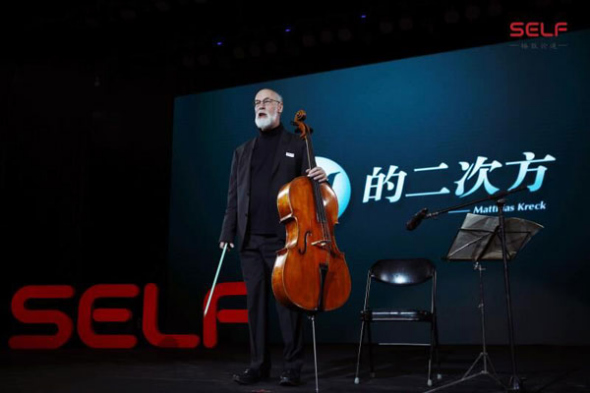
File photo of Matthias Kreck at the Science, Education, Life and Future Forum in Beijing. It is a TED-like forum jointly set up by CAS Computer Network Information Center and CAS Science Communication Bureau, promoting the cross-discipline communication of an elite's thoughts. (Photo provided to chinadaily.com.cn)
It is hard to imagine a link between the "two extremes" of music and math — the fields could not appear to be more different. Yet combining the two in one's life could have a remarkable effect on the mind, shaping and coloring a person's character.
"They occupy two different activity centers of our brain. Music creates great feeling and boosts emotional intelligence, while math is just the opposite — boosting rational intelligence," said German mathematician Matthias Kreck in an interview with China Daily website.
Information from each of the two disciplines is mapped onto a different area of the brain, but the extremes sometimes touch each other, said Kreck.
Born in a traditional, well-educated family in Herborn, Kreck, 70, grew up immersed in a musical environment and started learning musical instruments at the age of 4. Together with his four older sisters, Kreck said he practiced cello and violin three hours per day. "My mother controlled the practice at least half of the day," he told China Daily website, adding his father is a theological scientist.
"They care more about family education, particularly music, than school education."
To the teenage Kreck, math study said something about intelligence and it is the easiest thing to be acknowledged, while music carried almost magical healing powers, creating feelings of beauty and hope when he sometimes got bad grades.
"Now, a piece of music could give me relief from complicated math research," he said. "Before I start a piece of music, I have to learn the text for hours to make myself slow down. It is the same with math research."
Kreck said today, people live in a frantic, always-on world where everything happens fast. To slow down and observe the world carefully — that is what our society needs most, he said.
"It is the same with today's China," he added, remembering when he first came to Beijing in 1990, part of a German government delegation invited by the Chinese Academy of Sciences. "Much has changed since then."
He said he had never seen so many older people in his early tours to Beijing, but now he sees many young people rushing, running and hurrying into their future. Metropolises in Germany like Berlin and Hamburg share this similarity with China's big cities, he said.


















































